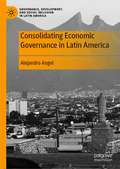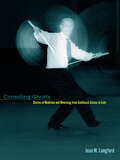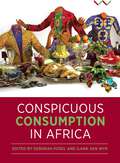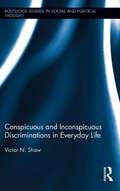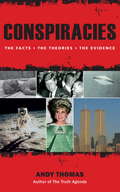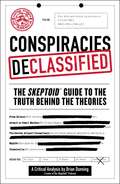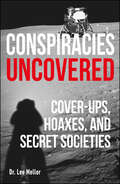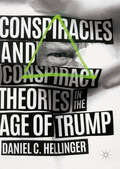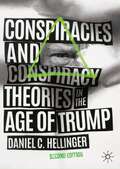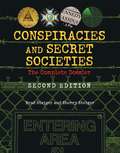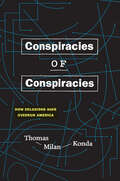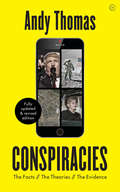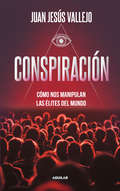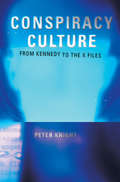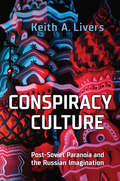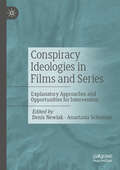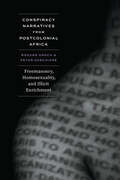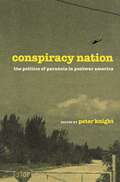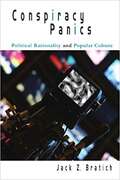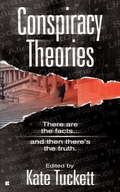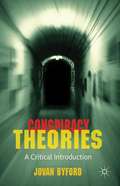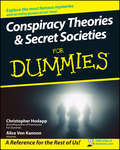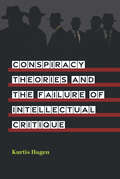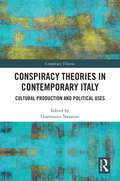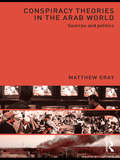- Table View
- List View
Consolidating Economic Governance in Latin America (Governance, Development, and Social Inclusion in Latin America)
by Alejandro AngelThis book explains how Latin American countries consolidate economic governance after serious disruptions to their formal and informal policy making routines. It asserts that the process of institutional change that started as a result of such disruptions resulted in complementary institutions, which supported a new consolidated pattern of economic governance. In addition, this work also offers a robust theoretical underpinning to economic governance, independent from performance. Performance figures prominently as a criterion to assess economic governance; however, crises are becoming more frequent and performance does not entirely depend on governments’ actions. This book argues that governance in the economic arena depends on the ability and feasibility of limiting the discretion of vested interests over economic policies insofar as these interests can shift the costs of their actions so the rest of the society bears them.
Consoling Ghosts: Stories of Medicine and Mourning from Southeast Asians in Exile
by Jean M. LangfordIn conversation with emigrants from Laos and Cambodia, Jean M. Langford repeatedly met with spirits: the wandering souls of the seriously ill, dangerous ghosts of those who died by violence, restless ancestors displaced from their homes. For these emigrants, the dead not only appear in memories, safely ensconced in the past, but also erupt with a physical force into the daily life and dreams of the present. Inspired by these conversations, Consoling Ghosts is a sustained contemplation of relationships with the dying and the dead. At their heart, as Langford&’s work reveals, emigrants&’ stories are parables not of cultural difference but rather of life and death. Langford inquires how and why spirits become implicated in remembering and responding to violence, whether the bloody violence of war or the more structural violence of social marginalization and poverty. What is at stake, she asks, when spirits break out of their usual confinement as symbolic figures for history, heritage, or trauma to haunt the corridors of hospitals and funeral homes? Emigrants&’ theories and stories of ghosts, Langford suggests, inherently question the metaphorical status of spirits, in the process challenging both contemporary bioethics of dying and dominant styles of mourning. Consoling Ghosts explores the possibilities opened up by a more literal existence of ghosts, from the confrontation of shades of past violence through bodily ritual to rites of mourning that unfold in acts of material care for the dead instead of memorialization. Ultimately the book invites us to consider alternate ways of facing death, conducting relationships with the dead and dying, and addressing the effects of violence that continue to reverberate in bodies and social worlds.
Conspicuous Consumption in Africa
by Ilana van Wyk Deborah PoselA collection of essays examining cultures of consumption on the African continentFrom early department stores in Cape Town to gendered histories of sartorial success in urban Togo, contestations over expense accounts at an apartheid state enterprise, elite wealth and political corruption in Angola and Zambia, the role of popular religion in the political intransigence of Jacob Zuma, funerals of big men in Cameroon, youth cultures of consumption in Niger and South Africa, queer consumption in Cape Town, middle-class food consumption in Durban and the consumption of luxury handcrafted beads, this collection of essays explores the ways in which conspicuous consumption is foregrounded in various African contexts and historical moments. The essays in Conspicuous Consumption in Africa put Thorstein Veblen’s concept under robust critical scrutiny, delving into the pleasures, stresses and challenges of consuming in its religious, generational, gendered and racialised aspects, revealing conspicuous consumption as a layered set of practices, textures and relations. This volume shows how central and revealing conspicuous consumption can be to fathoming the history of Africa’s projects of modernity, and their global lineages and legacies. In its grounded, up-close case studies, it is likely to feed into current public debates on the nature and future of African societies – South African society in particular.
Conspicuous and Inconspicuous Discriminations in Everyday Life (Routledge Studies in Social and Political Thought #80)
by Victor N. ShawIn everyday life, people negotiate on issues, entertain offers and counteroffers, and gain or lose in terms of economic capital, political power, communal status, and social influence. Although life goes on in the form of compromise, feelings of discrimination or misfortune haunt consciously or unconsciously in the minds of living individuals. History continues in the spirit of forgiveness, but residues of exploitation or injustice remain conspicuously or inconspicuously on the records of progressing civilizations. This study follows an average everyday life to compare individuals with individuals, individuals with organizations, and organizations with organizations in their everyday interactions. Through the eyes of the person, conspicuous and inconspicuous discriminations by one against another, whether individual or organizational, are identified in different occasions, on a typical day, at home, in the workplace, in the community, within the country, around the world, and throughout the course of life. In the style of Socrates, Plato, Wittgenstein, and other classical scholarship, this study uses ordinary, typical situations to demonstrate critical points, reveal subtle connections, and present important arguments. It offers vivid examples for what social scientists strive to find: the extraordinary from the ordinary, the unfamiliar from the familiar, the different from the similar, and the significant from the trivial. This study offers an opportunity for readers to reflect upon their social experiences, and rethink and reshape their everyday acts and actions.
Conspiracies
by Andy ThomasAt any time in our history, you will find significant and seemingly indisputable events occurring, the kind that can change the course of our lives. Yet for every one of them, somebody, somewhere will loudly dispute the 'official' account, doubting that the truth has been told. In today's environment, with trust in authorities at an all-time low, conspiracy theories have found a new currency, and websites and social networking ensure they receive a wider and more rapid spread than ever before. But how do we separate truth from imagination? Was Princess Diana murdered, as many people think, despite all the official denials? Did NASA really go to the Moon, when anomalies in the photographic record suggest otherwise? Could 9/11 really have been set up by agencies within the USA itself? The author opens the conspiracy casebook by examining the mindset of those who believe in conspiracies, and considers whether the dismissive attitude towards them has been fair. Part Two looks into history to establish that conspiracies do occur, credibility should therefore be given to belief in some of the alleged plots and cover-ups of today.This leads into a well-argued examination of some of the most popular conspiracies of our times, including theories over assassinations, UFO cover-ups, and widely voiced concerns over 9/11 and the 'New World Order'. Part Three draws the conclusion that while not all conspiracy theories can be proven, they do at least draw attention to paths not to take, and can be valuable in helping to create a better world where new trust and hope can be forged. Are we living in a world of control, of oppression, of habitual deception? Is this really how things are, or simply human nature massively distorted through a dark lens? The truth probably lies somewhere in the middle.
Conspiracies Declassified: The Skeptoid Guide to the Truth Behind the Theories
by Brian DunningA collection of the wildest conspiracies to ever exist, from mind control experiments to lizard people, this book explores, debunks—and sometimes proves—the secret stories that don&’t quite make it into the history books.What&’s fact and what&’s fiction? With conspiracy theories, sometimes it&’s hard to get to the truth! In Conspiracies Declassified, author and expert skeptic Brian Dunning explains fifty true stories of famous conspiracies throughout history. From the moon landing hoax, to chemtrails, to the mind control dangers of fluoride, Dunning is here to sort the truth from the lies to tell you what really happened.
Conspiracies Uncovered: Discover the World's Biggest Secrets
by Dr. Lee MellorEnter a hidden world of mysteries, scandals, secrets, and liesPerhaps it is human nature to believe there is more to the world than meets the eye - that the greatest secrets and truths are hidden from us. Whatever the reason, conspiracy theories are a global phenomenon. Conspiracies Uncovered delves into some of the most pervasive theories, from the "The assassination of John F. Kennedy" to the moon landings, showcasing the evidence for and against each one, revealing the surprising truths behind some and the bizarre inspirations for others.
Conspiracies and Conspiracy Theories in the Age of Trump
by Daniel C. HellingerThis book focuses on the constant tension between democracy and conspiratorial behavior in the new global order. It addresses the prevalence of conspiracy theories in the phenomenon of Donald Trump and Trumpism, and the paranoid style of American politics that existed long before, first identified with Richard Hofstadter. Hellinger looks critically at both those who hold conspiracy theory beliefs and those who rush to dismiss them. Hellinger argues that we need to acknowledge that the exercise of power by elites is very often conspiratorial and invites both realistic and outlandish conspiracy theories. How we parse the realistic from the outlandish demands more attention than typically accorded in academia and journalism. Tensions between global hegemony and democratic legitimacy become visible in populist theories of conspiracy, both on the left and the right. He argues that we do not live in an age in which conspiracy theories are more profligate, but that we do live in an age in which they offer a more profound challenge to the constituted state than ever before.
Conspiracies and Conspiracy Theories in the Age of Trump
by Daniel C. HellingerConspiracies and Conspiracy Theory in the Age of Trump stands out in the burgeoning literature on conspiracism with its call for political scientists to analyze not only “conspiracy theory” as political pathology but conspiracies themselves as political behavior symbiotically related to moral hazards and other forces unleashed by dark money, disinformation, changing technologies, and globalization. This new updated edition extends this analysis to the belief by many Americans that the 2020 election was stolen, resistance to social measures to counter the Covid epidemic, attempts by Trump and his allies to “stop the steal,” and the resulting mob insurrection at the Capitol on January 6. We likely will see both conspiracism and actual conspiracies play a greater role due to institutional decay in American politics. For this reason, political scientists need to analyse and theorize the role of conspiracies in politics—why they prosper and fail, how conspiracies may inflect political outcomes, what relationship they bear to social forces unleashed by great economic and social change.
Conspiracies and Secret Societies
by Brad Steiger Sherry SteigerThis new edition collects and celebrates the thousands of world-moving people and hard-to-find facts and accomplishments that have helped shape society and culture. It recognizes and honors both renowned and lesser-known barrier-breaking trailblazers in all fields-arts, entertainment, business, civil rights, education, government, invention, journalism, religion, science, sports, music, and more. With more than 350 photos and illustrations, this vital collection includes thousands of personal victories and triumphs. Revel and rejoice in the hard work accomplished by these men and women who overcame adversity and difficulties. Read about change, progress, and the pioneers
Conspiracies of Conspiracies: How Delusions Have Overrun America
by Thomas Milan KondaIt’s tempting to think that we live in an unprecedentedly fertile age for conspiracy theories, with seemingly each churn of the news cycle bringing fresh manifestations of large-scale paranoia. But the sad fact is that these narratives of suspicion—and the delusional psychologies that fuel them—have been a constant presence in American life for nearly as long as there’s been an America. In this sweeping book, Thomas Milan Konda traces the country’s obsession with conspiratorial thought from the early days of the republic to our own anxious moment. Conspiracies of Conspiracies details centuries of sinister speculations—from antisemitism and anti-Catholicism to UFOs and reptilian humanoids—and their often incendiary outcomes. Rather than simply rehashing the surface eccentricities of such theories, Konda draws from his unprecedented assemblage of conspiratorial writing to crack open the mindsets that lead people toward these self-sealing worlds of denial. What is distinctively American about these theories, he argues, is not simply our country’s homegrown obsession with them but their ongoing prevalence and virulence. Konda proves that conspiracy theories are no harmless sideshow. They are instead the dark and secret heart of American political history—one that is poisoning the bloodstream of an increasingly sick body politic.
Conspiracies: The Facts. The Theories. The Evidence [Fully revised, new edition]
by Andy ThomasAt any time in our history, you will find significant and seemingly indisputable events occurring, the kind that can change the course of our lives -- the assassination of President John F. Kennedy, the terrorist attacks of 9/11. Yet for every one of them, somebody, somewhere will loudly dispute the 'official' account, doubting that the truth has been told. In today's environment, with trust in authorities at an all-time low, conspiracy theories have found a new currency, and websites and social networking ensure they receive a wider and more rapid spread than ever before. But how do we separate truth from imagination? Was Princess Diana murdered, as many people think, despite all the official denials? Did NASA really go to the Moon, when anomalies in the photographic record suggest otherwise? Could 9/11 really have been set up by agencies within the USA itself? The author opens the conspiracy casebook by examining the mindset of those who believe in conspiracies, and considers whether the dismissive attitude towards them has been fair. Part Two looks into history to establish that conspiracies do occur, credibility should therefore be given to belief in some of the alleged plots and cover-ups of today.This leads into a well-argued examination of some of the most popular conspiracies of our times, including theories over assassinations, UFO cover-ups, and widely voiced concerns over 9/11 and the 'New World Order'. Part Three draws the conclusion that while not all conspiracy theories can be proven, they do at least draw attention to paths not to take, and can be valuable in helping to create a better world where new trust and hope can be forged. Are we living in a world of control, of oppression, of habitual deception? Is this really how things are, or simply human nature massively distorted through a dark lens? The truth probably lies somewhere in the middle.
Conspiración
by Juan Jesús VallejoHistorias de conspiración internacional que van desde los Ilimiunati y ovnis hasta llegar a los reptilianos en ocho apasionantes capítulos. Qué se esconde detrás del alunizaje? ¿Por qué se nos oculta la raíz de conflictos como el de Oriente Medio? ¿Qué tienen que ver los Illuminati con el gobierno más poderosodel mundo? A pesar de vivir en una época donde es más fácil que nunca acceder a la información, Juan Jesús Vallejo nos muestra que la mentira y el engaño siguen estando a la orden del día. En Conspiración, este reconocido periodista de misterio, que ha recorrido los cinco continentes investigando episodios fascinantes, emprende un nuevo viaje por algunos de los secretos mejor guardados en la historia. En ocho capítulos, que abarcan desde la Antigüedad hasta hoy, y acudiendo a teorías conspirativas, el autor muestra cómo algunos hitos históricos han sido orquestados mediante engaños y mentiras, o se han ocultado sus aspectos menos amables. Así, busca revelar información privilegiada sobre cómo la historia y la opinión pública son manipuladas a diario, y nos invita a ser menos crédulos y a pensar dos veces antes de tomar algo por cierto.
Conspiracy Culture: From Kennedy to The X Files
by Peter Knight Dr Peter KnightConspiracy theories are everywhere in post-war American culture. From postmodern novels to The X-Files and from gangsta rap to feminist polemic, there is a widespread suspicion that sinister forces are conspiring to take control of our national destiny, our minds, and even our bodies. Conspiracy explanations can no longer be dismissed as the paranoid delusions of far-right crackpots. Indeed, they have become a necessary response to a risky and increasingly globalized world, in which everything is connected but nothing adds up.Peter Knight provides an engaging and cogent analysis of the development of conspiracy culture, from 1960s' countercultural suspicions about the authorities to the 1990s, where a paranoid attitude is both routine and ironic. Conspiracy Culture analyses conspiracy narratives about familiar topics like the Kennedy assassination, alien abduction, body horror, AIDS, crack cocaine, the New World Order, as well as more unusual ones like the conspiracies of patriarchy and white supremacy.Conspiracy Culture shows how Americans have come to distrust not only the narratives of the authorities, but even the authority of narrative itself to explain What Is Really Going On. From the complexities of Thomas Pynchon's novels to the endless mysteries of The X-Files, Knight argues that contemporary conspiracy culture is marked by an infinite regress of suspicion. Trust no one, because we have met the enemy and it is us.
Conspiracy Culture: Post-Soviet Paranoia and the Russian Imagination
by Keith A. LiversContemporary Russia stands apart as one of the most prolific generators of conspiracy theories and paranoid rhetoric. Conspiracy Culture traces the roots of the phenomenon within the sphere of culture and history, examining the long arc of Russian paranoia from the present moment back to earlier nineteenth-century sources, such as Dostoevsky’s anti-nihilist novel Demons. Conspiracy Culture examines the use of conspiracy tropes by contemporary Russian authors and filmmakers including the postmodernist writer Viktor Pelevin, the conservative author and pundit Aleksandr Prokhanov, and the popular director Timur Bekmambetov. It also explores paranoia as an instrument within contemporary Russian political rhetoric, as well as in pseudo-historical works. What stands out is the manner in which popular paranoia is utilized to express broadly shared fears not only of a long-standing anti-Russian conspiracy undertaken by the West, but also about the destruction of the country’s cultural and spiritual capital within this imagined "Russophobic" plot.
Conspiracy Ideologies in Films and Series: Explanatory Approaches and Opportunities for Intervention
by Denis Newiak Anastasia SchnitzerCorona as a staged instrument of oppression, secretly kept vaccination deaths or politicians drinking children's blood: at the latest since the outbreak of the Covid 19 pandemic, conspiracy ideologies are booming and harm social peace and democratic will formation through their dogmatism. So-called conspiracy theories generate systematic distrust of legitimate political institutions and can contribute to social polarization, dangerous populism and extremist escalation. Conspiracy ideologies have always been a topic in movies and television series, as they have always dealt with the relationship between reality and illusion, truth and fiction, reality and dream, sense and madness through their cinematic means. Series and films not only serve as a discursive space for social self-understanding, but also, through their complex narratives, constellations of characters and aesthetics, offer catchy explanations for the emergence and spread of conspiracy narratives. At the same time, theymake suggestions, some of them astonishingly concrete, for dealing with such collective delusions. What can we learn from the fictional worlds of series and films for dealing with this very real contemporary phenomenon?
Conspiracy Narratives from Postcolonial Africa: Freemasonry, Homosexuality, and Illicit Enrichment
by Peter Geschiere Rogers OrockDecoding conspiracy thinking at the nexus of sexuality, Freemasonry, and the occult. In this book, anthropologists Rogers Orock and Peter Geschiere examine the moral panic over a perceived rise in homosexuality that engulfed Cameroon and Gabon beginning in the early twenty-first century. As they uncover the origins of the conspiratorial narratives that fed this obsession, they argue that the public’s fears were grounded in historically situated assumptions about the entanglement of same-sex practices, Freemasonry, and illicit enrichment. This specific panic in postcolonial Central Africa fixated on high-ranking Masonic figures thought to lure younger men into sex in exchange for professional advancement. The authors’ thorough account shows how attacks on elites as homosexual predators corrupting the nation became a powerful outlet for mounting populist anger against the excesses and corruption of the national regimes. Unraveling these tensions, Orock and Geschiere present a genealogy of Freemasonry, taking readers from London through Paris to francophone Africa and revealing along the way how the colonial past shapes present-day anxieties linking same-sex practices to enrichment.
Conspiracy Nation: The Politics Of Paranoia In Postwar America
by Peter KnightWhy are Americans today so fascinated by the X-Files? How did rumors emerge about the origins of the AIDS virus as a weapon of biowarfare? Why does the Kennedy assassination provoke heated debate nearly forty years after the fact, and what do we make of Hillary Clinton's accusation of a "vast right-wing conspiracy" against her husband? The origins of these ideas reveal important facets of American culture and politics. <p><p> Placing conspiracy thinking at the center of American history, and challenging the knee-jerk dismissal of conspiratorial thought as deluded and sometimes dangerous, Conspiracy Nation provides a wide-ranging survey of conspiracy theories in contemporary America. In the 19th century, inflammatory rhetoric about slave revolts, the well-publicized specter of the black rapist, and the formation of the Ku Klux Klan all worked as conspiracy theories to legitimate an emerging sense of national consciousness based on an ideology of white supremacy. Today, panicked responses to increasing multiculturalism and globalization yield new notions of victimhood and new theories about conspiratorial plans for global domination. <p> Offering up a provocative array of examples, ranging from alien abduction to the novels of DeLillo and Pynchon to Tupac Shakur's "paranoid style," Conspiracy Nation documents and unearths the workings of conspiracy in the contemporary moment. Their conclusions, sometimes startling and always compelling, have much to say about the nature of identity and anxiety, imagination and politics, and the state of the American psyche today. Contributors: Clare Birchall, Jack Bratich, Bridget Brown, Jodi Dean, Ingrid Walker Fields, Douglas Kellner, Peter Knight, Fran Mason, John A. McClure, Timothy Melley, Eithne Quinn, and Skip Willman.
Conspiracy Panics: Political Rationality and Popular Culture
by Jack Z. BratichExamines contemporary anxiety over the phenomenon of conspiracy theories. <p><p> While most other works focus on conspiracy theories, this book examines conspiracy panics, or the anxiety over the phenomenon of conspiracy theories. Jack Z. Bratich argues that conspiracy theories are portals into the major social issues defining U.S. and global political culture. These issues include the rise of new technologies, the social function of journalism, U.S. race relations, citizenship and dissent, globalization, biowarfare and biomedicine, and the shifting positions within the Left. Using a Foucauldian governmentality analysis, Bratich maintains that conspiracy panics contribute to a broader political rationality, a (neo)liberal strategy of governing at a distance through the use of reason. He also explores the growing popularity of 9/11 conspiracy research in terms of what he calls the “sphere of legitimate dissensus.” Conspiracy Panics concludes that we are witnessing a new fusion of culture and rationality, one that is increasingly shared across the political spectrum. <p><p> Jack Z. Bratich is Assistant Professor of Journalism and Media Studies at Rutgers, the State University of New Jersey and the coeditor (with Jeremy Packer and Cameron McCarthy) of Foucault, Cultural Studies, and Governmentality, also published by SUNY Press.
Conspiracy Theories
by Jamie KingDid Michael Jackson fake his own death in a bid to escape financial ruin? Is swine flu a dastardly plot by global pharmaceutical companies or a scare campaign created by the pork industry's competitors? Are the British Royal Family really reptilian shape-shifting aliens? You'll discover startling evidence on these topics and many more in this compelling compendium of the world's scariest and wackiest conspiracy theories. This guide leaves no stone unturned as it delves into such conundrums as the mysterious circumstances of Alexander Litvinenko's death, the alleged withheld evidence pertaining to the 7 July bombings and whether global warming is a hoax. Whether you're a sceptic or a self-confessed conspiracy junkie, you'll find a cover-up for every occasion. And remember, just because you're paranoid doesn't mean they're not after you...
Conspiracy Theories
by Jovan ByfordThrough a series of specific questions that cut to the core of conspiracism as a global social and cultural phenomenon this book deconstructs the logic and rhetoric of conspiracy theories and analyses the broader social and psychological factors that contribute to their persistence in modern society.
Conspiracy Theories and Secret Societies For Dummies
by Alice Von Kannon Christopher HodappEntering the world of conspiracy theories and secret societies is like stepping into a distant, parallel universe where the laws of physics have completely changed: black means white, up is down, and if you want to understand what's really going on, you need a good reference book. That's where Conspiracy Theories & Secret Societies For Dummies comes in.Whether you're a skeptic or a true believer, this fascinating guide, packed with the latest information, walks you through some of the most infamous conspiracy theories -- such as Area 51 and the assassination of JFK -- and introduces you to such mysterious organizations as the Freemasons, the Ninjas, the Mafia, and Rosicrucians. This behind-the-curtain guide helps you separate fact from fiction and helps you the global impact of these mysterious events and groups on our modern world. Discover how to:Test a conspiracy theorySpot a sinister secret societyAssess the Internet's role in fueling conspiracy theoriesExplore world domination schemesEvaluate 9/11 conspiracy theoriesFigure out who "they" areGrasp the model on which conspiracy theories are builtFigure out whether what "everybody knows" is trueDistinguish on assassination brotherhood from anotherUnderstand why there's no such thing as a "lone assassin"Why do hot dogs come in packages of ten, while buns come in eight-packs? Everybody knows its a conspiracy, right? Find out in Conspiracy Theories & Secret Societies For Dummies.
Conspiracy Theories and the Failure of Intellectual Critique
by Kurtis HagenConspiracy Theories and the Failure of Intellectual Critique argues that conspiracy theories, including those that conflict with official accounts and suggest that prominent people in Western democracies have engaged in appalling behavior, should be taken seriously and judged on their merits and problems on a case-by-case basis. It builds on the philosophical work on this topic that has developed over the past quarter century, challenging some of it, but affirming the emerging consensus: each conspiracy theory ought to be judged on its particular merits and faults. The philosophical consensus contrasts starkly with what one finds in the social science literature. Kurtis Hagen argues that significant aspects of that literature, especially the psychological study of conspiracy theorists, has turned out to be flawed and misleading. Those flaws are not randomly directed; rather, they consistently serve to disparage conspiracy theorists unfairly. This suggests that there may be a bias against conspiracy theorists in the academy, skewing “scientific” results. Conspiracy Theories and the Failure of Intellectual Critique argues that social scientists who study conspiracy theories and/or conspiracy theorists would do well to better absorb the implications of the philosophical literature.
Conspiracy Theories in Contemporary Italy: Cultural Production and Political Uses (Conspiracy Theories)
by Gianmarco NavariniThis volume explores the role played by conspiracy narratives in the contemporary Italian political, cultural, and social context, through a series of case studies.It begins with a historical and genealogical account of the troubled success of Italian conspiracy thinking from the early 1970s to the present day. Among the issues examined are the unclear division between legitimate/illegitimate forms of knowledge, the use of conspiracy as a confrontational discursive device, the emergence of moral panic, and the stabilization of information outlets against dominant official explanations. The analysis covers the case of a well-known national survey, and a digital platform specializing in conspiracy storytelling. The second axis of the book concerns the pervasive use of conspiracy as a theory or narrative that currently circulates in various Italian cultural fields: multiculturalism, immigration, and racism; Catholic traditionalism; football fandom; small business economics; and cooking and food.This volume will be of interest to researchers of conspiracy theories, and Italian politics and history.
Conspiracy Theories in the Arab World: Sources and Politics
by Matthew GrayConspiracy theories, while not unique to the Middle East, are a salient feature of the political discourses of the region. Strongly reflecting and impacting on state-society relations and indigenous impressions of the world beyond the region, they affect how political behaviour within and among the states of the region is situated, structured, and controlled. Discounting the common pathological explanation for conspiracism, the author argues that a complex mix of political factors account for most conspiracy theories in the contemporary Arab world. The author argues that the region’s modern history, genuine conspiracies, the complex and oftentimes strained relationship between state and society, the role of the state and the mass media as conspiracy theorists, and the impacts of new technologies have all helped to develop and sustain conspiracist narratives. Drawing on a range of examples and cases, including the impacts of globalization, economic reform, weak state legitimacy, the war in Iraq, the Arab-Israeli issue, the rise of political Islamism, and internet and satellite television, the book illuminates the complex sources of conspiracy theories. Providing a comprehensive overview of this controversial topic, this book will appeal not only to students and scholars interested in Middle East studies, political science, globalization and conspiracy theories, but to anyone seeking an understanding of the region’s complex economic, social, and cultural dynamics.
